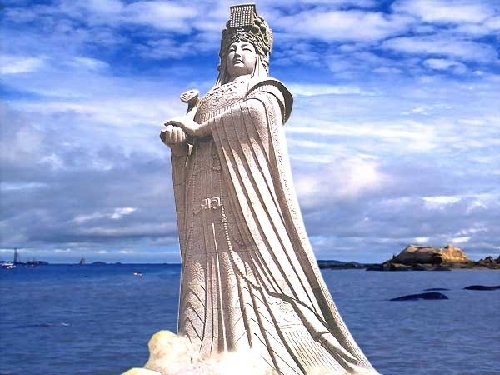Chinese Way
Mazu culture and Xunpu women
Updated: 2011-03-09 11:00
(cultural-china.com)
Quanzhou, situated on the southeastern coast of East China's Fujian province, was an important harbor and the starting point on the Maritime Silk Road. Boats loaded with goods would shuttle back and forth between the ships and the wharves, already piled high with goods. After unloading items such as spices, ivory, pearls, hawksbill turtles, and rhinoceros horns, the ships would then take on silk, porcelain, tea, and Chinese arts and crafts before sailing back home.
|
 |
In Quanzhou, there is a small coastal fishing village with its own unique traditions. The women there are famous for raising oysters, and for their business skills at local markets. Their habit of putting fresh flowers in their hair and their special ways of worship add scenic beauty and mystery to this part of the city.
The village is called Xunpu. It is about ten miles away from Quanzhou. Residents here make a living by fishing. The traditional folk customs of garments, weddings and festivals are well preserved. The original oyster shell house is brimming with a kind of fisher-folk atmosphere. The village has a reputation for 'Xunpu Women' and 'Xunpu Oyster Shell House'. People arrive at the village to take photographs, read literature about the place, and participate in fine arts making. The number of tourists to the place is increasing day by day.
When arriving at Xunpu village, what catch the eyes of visitors first are the women. They may not be good-looking, but their hairdo is unique and attracts the curiosity of tourists. One or two circles of flowers are stuck into their heads with different colors and different kinds such as tulips and carnations. 68-year-old Huang Ronghui has been living in the village since his childhood. As director of the Seniors Association in this village, he explains to us that such hairdo is a symbolic sign of the woman there.
"Flowers have a natural meaning and such hairdo has been passed from generation to generation. When a woman gets married or gives birth to a baby, she is supposed to wear the flowers. The flowers are all fresh. In winter, the hairdo can last for 3 days while in summer it can last 2 days. When women sleep at night, they will put the garland into water to keep it fresh."
Every year, on the 23rd day of the third lunar month, said to be the birthday of Mazu, fishermen go to the Mazu temple to worship the goddess instead of going fishing. In this picture, women over the age of 60 worship their goddess, Mazu.(Photo by CRIENGLISH.com) When we arrived at the village, we found that people in the village were quite busy. They were all dressed in traditional clothing, and were preparing for the celebration of the sea goddess Mazu's birthday, which falls on the 23rd day of the third lunar month.
Mazu is the most worshipped sea goddess in China's costal areas, especially in the southeast and Taiwan islands. According to legend, originally named Moniang, Mazu was the daughter of Lin Yuan, the superintendent of Fujian in the early Northern Song Dynasty. Her name Moniang means "silent girl", because she didn't cry at birth. In her early teens, she began to burn incense and chant sutras. At the age of 16, she was given a bronze talisman by an immortal, and she then achieved Taoist success, becoming an immortal herself. As legend has it, she performed many magical feats. At 28, she ascended Meifeng Peak, where she became a divinity. After that, Moniang roamed about the country, rescuing and helping distressed fishermen at sea. Local fishermen built a temple in Moniang's hometown—Meizhou Island in Fujian, to pay respect to her. And she was honored as "Mazu".
Zhou Yumin, former mayor of Quanzhou, explains why Mazu is so significant to Quanzhou people.
"Heavenly Queen, or Mazu, is the sea goddess of protection of fishermen. Those who did business in ancient times frequently worshiped her. At that time, navigation facilities weren't well developed and it was difficult for people to struggle with the turbulent sea, which was very dangerous. They needed something to have faith in, which was Mazu."
Every year, on the birthday of Mazu, there is a grand celebration to worship her in Xunpu village. The celebration lasts two to three days. Some middle-aged and elderly women dress up in red coats, black pants and flat coiled hair. These devout women burn incense to pay tribute to Mazu. This annual event has attracted people from all walks of life. 67-year-old Huang Liqing is a villager there. She often sets out to sea to catch oysters. She told us what she had prepared for this day.
"Tomorrow is Mazu's birthday. We prepared meat balls, various kinds of fish and shrimps. We hope Mazu will bless us with a safe life."
Believe it or not, such worship seems not to be in vain. There is a story saying once when some fishermen went fishing in the sea, their ship nearly sank. They shouted loudly and asked Mazu for help. After hours of struggle, they returned safely. 22-year-old Zhang Yumei is a college student from the village. Although she is exposed to modern society, she thinks that such a festival should be preserved.
"I think the worship reflects Mazu culture. It's a good way to communicate with people across the straits. Some people may think it is just simple superstition, but I prefer to take it as culture. When you see the scale of the celebrations, you can see it's a unique culture of our own."
E-paper

Sindberg leaves lasting legacy
China commemorates Danish hero's courage during Nanjing Massacres.
Preview of the coming issue
Crystal Clear
No more tears
Specials

NPC & CPPCC sessions
Lawmakers and political advisers gather in Beijing to discuss major issues.

Sentimental journey
Prince William and Kate Middleton returned to the place where they met and fell in love.

Rent your own island
Zhejiang Province charts plans to lease coastal islands for private investments
